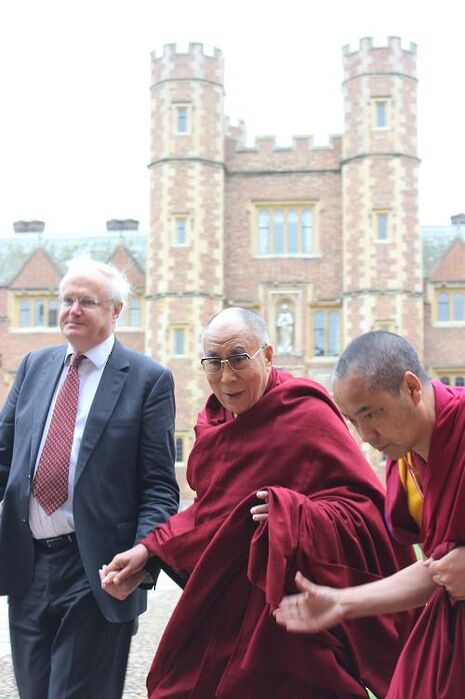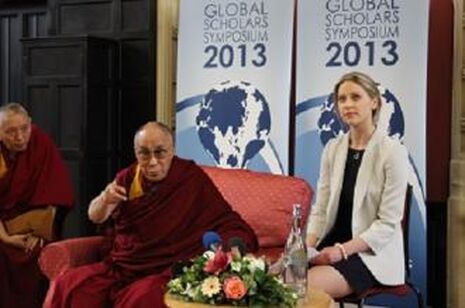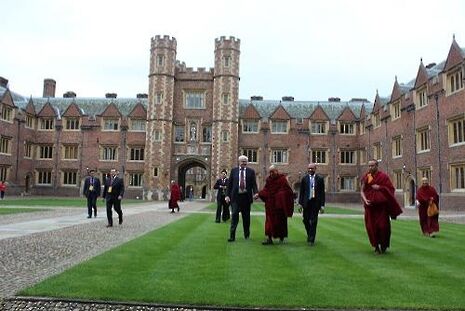Buddhism, the Dalai Lama and me
‘Whether one believes in a religion or not and whether one believes in rebirth or not, there isn’t anyone who doesn’t appreciate kindness and compassion.’ Dalai Lama
When I was 14 I skipped school. It wasn’t to go drink VKS in the park like other ‘kids my age’. I went see the Dalai Lama speak at the ‘Burswood Dome’ in Western Australia, a venue graced by the likes of Elton John and boasting a humungous casino complex. In light of his recent visit to Cambridge and the very valid and interesting discussion that it has caused (for once) I would like to put the case for the Dalai Lama: though he’s far from perfect, his critical acclaim is justifiable. I will do this by asking three questions (#debatingrules).

What does the Dalai Lama bring spiritually?
Without sounding like a new-age-spiritual-twat, I do like Buddhism. When comparing the values of Catholisism and Buddhism, or the Pope and the Dalai Lama as critics tend to, the Dalai Lama definitely wins. Why do people poke fun at Catholicism and not Buddhism? Because Buddhism accepts all religions (even atheists), preaches true tolerance, and provides gems of self-help, which are useful for anyone.
There are two points I should clear up here. Unlike the Pope, the Dalai Lama does not claim to lead the Bhuddist faith, which is important. He is simply held in such esteem that people choose to listen to him. Secondly, his perpetual ‘giggling’ and joke making, often called into question, is for me potentially the most uplifting, amazing thing about Tenzin Gyatso. For a religion teaching love, compassion and joy, he is a true personal reflection of those values. He is approachable and charismatic. The Pope just seems miserable.
With that exuding kindness and humanity also comes flexibility. The 14thDalai Lama is far more flexible in his spiritual teachings than many other religious leaders. Whereas Catholic and Islamic leaders are painstakingly slow in updating their views on women, the Dalai Lama has said that the lack of women to engaging in the highest echelons of Buddhism ‘has made me somewhat uncomfortable, especially since the Buddha gave equal opportunities to women...,we introduced the same levels of studies for both males and females. Now it is possible for both men and women to get doctorates in Buddhist studies.’ I’m all for spiritual leaders who show an ability to recognise developments in modern ethics.

What does the Dalai Lama bring politically?
Many, perhaps justifiably, claim to be sick of the Dalai Lama being called a ‘symbol’ for hope. But this seemingly simplistic proclamation masks something actually rather important. First, the Dalai Lama advocates non-violent resistance for Tibetan autonomy not separatism. Why is this important? Well he is a moderate and he advocates non-violence in a very volatile area. Moreover, to claim he has done nothing ignores the fact that the Dalai Lama lives in exile from his own people. You may detect his Indian accent which he obtained, as he is not allowed to return to Tibet because the Chinese fear him so much. That reflects his power. Eventually his symbolic value could be hugely important for the autonomy of Tibet. Moreover, he has been instrumental in helping the Mongols, Buryats and Kalmyks (who are also followers of Tibetan Buddhism, and who also suffered under several decades of Communist, anti-religious oppression). The accusation that he ‘hasn’t taken a stance on the Afghani or Iraq war’ is just not true. In this interview he says that he explicitly wrote to Bush after 9/11 and asked him to take a non-violent approach.
Crucially the Dalai Lama sees his political role as non-existent once autonomy for Tibet is gained. He said in one interview ‘for the last forty-six years—we have undertaken strong efforts at democratization. In the last four years, we have established an elected political leadership. Since then, I have been in a position of semi-retirement. Once the day of our return comes, I will go into complete retirement’. Tenzin Gyatso became politically important only because of what happened in 1950s Tibet. He may not represent all Buddhists but he was a good representative of Tibetans at a time when they may have been forgotten or quashed into oblivion.

Why should we have him speak in Cambridge?
Because, though it is important to point out stuff like his alleged ‘homophobic’ comments, it is also important to point out his teachings of compassion and non-violence along with his fight for Tibetan justice are entirely relevant to contemporary political developments.
Disagree with Poppy? Have your say by emailing comment@varsity.co.uk
 News / Fitz students face ‘massive invasion of privacy’ over messy rooms23 April 2024
News / Fitz students face ‘massive invasion of privacy’ over messy rooms23 April 2024 News / Cambridge University disables comments following Passover post backlash 24 April 2024
News / Cambridge University disables comments following Passover post backlash 24 April 2024 Comment / Gown vs town? Local investment plans must remember Cambridge is not just a university24 April 2024
Comment / Gown vs town? Local investment plans must remember Cambridge is not just a university24 April 2024 Comment / Does Lucy Cavendish need a billionaire bailout?22 April 2024
Comment / Does Lucy Cavendish need a billionaire bailout?22 April 2024 Interviews / Gender Agenda on building feminist solidarity in Cambridge24 April 2024
Interviews / Gender Agenda on building feminist solidarity in Cambridge24 April 2024





